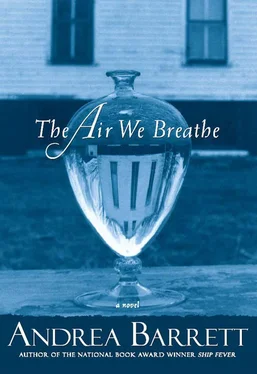Lying there alone, Leo tried to convince himself that the situation with Miles would heal itself quietly, gradually, in the same fashion that his lung was healing. He’d insulted Miles, he saw now. Back in March, when he’d turned down Miles’s generous offer to move him to Mrs. Martin’s house, he should have been more delicate; he might have expected that his refusal would make Miles feel like the outsider he was. Now Miles, obviously angry about more than just the box, was paying him back for his clumsiness. He’d apologize, Leo thought, and explain why he’d wanted to stay here. Although even if that worked, it wouldn’t fix what was going on with us. Until he’d heard that humming from our porches, he’d always assumed that here — up in the mountains, far from the crowds; here, where the air was clear — he was safe from the poison of his last weeks in New York, when everyone had turned from him.
Much of what happened to him then had stemmed, he thought, from his bad luck in falling ill when another disease was raging through his neighborhood, and when his landlady was already so worried about her children. The streets along which he walked to work had fallen strangely silent soon after the first cases of infantile paralysis were diagnosed. The pool had closed, then the movie house, and then the ball field had emptied; men came and shot the dogs and cats in the alleys, to keep them from spreading the disease. Silenced, the days had felt like nights. In the shops, people turned away from each other, fingering the little bags of camphor and garlic hanging from their necks and embarrassed — had they been embarrassed? — not to be able to help each other for fear of infecting their own children. Everything had seemed infected. Bricks leapt from the roof of a building struck by lightning and hit the children walking below; a hammer glancing off a pipe at the oil plant in Greenpoint set off an explosion; a subway excavation caved in and buried twenty workers. In Williamsburg, mothers carried into the clinics screaming babies who could no longer wave their arms or hold their bottles, while others hid from the nurses who knocked on doors. Rumors spread: that the doctors got a bonus for each child captured and taken to the hospital. That the children got sick from eating ice cream, which chilled their stomachs, and that stores sold them ice cream anyway. That gasoline fumes spread the disease (why were automobiles still allowed on the streets?), or commercial laundries (the germs moved in the sheets). That the mothers of stricken children shook their sleeves over the cans of purified milk at the milk stations, hoping other children might sicken as well.
He’d found those rumors terrifying. He knew what happened when they spread, and he knew how the solitary were punished. During his last year at the refinery, after he began working as Karl’s assistant, he’d been neither a salaried employee nor quite one of the regular laborers. Upstairs, where the magma spun in the centrifuges and the raw-sugar crystals, separated from the syrup, tumbled into the melter, he was alone when he tested the liquor’s acidity, adding milk of lime until the proteins coagulated and then telling the foreman when to release the fluid into the cloth filters packed with diatomaceous earth. Alone at the other end of the line, he tested the final product; alone on the dock, he sampled the loads of raw sugar. Only by a freakish bit of bad luck had a stranger seen him cough blood onto the crystals, and then he’d had no friend to lie for him.
The two refinery workers who brought him home and helped him up to the flat told Rachel and Tobias exactly what had happened. Rachel, whose sister had died of tuberculosis, wanted to evict him from the apartment immediately, but Tobias reminded her of how much they needed the rent. After the tuberculosis nurse made her visit, Rachel had added her own refinements to the nurse’s advice. She washed Leo’s plate and utensils separately and stored them in a cardboard box kept out on the fire escape, where she made him eat his meals. Her children ran, holding their breath, when they had to pass his cot to get to their own. The four other boarders, after watching this, hung a spare sheet from the ceiling between his cot and theirs. He’d learned, then, what it really meant to have no family. Not having kin here, and not having roots in a single village or city, had set him apart more than he’d understood. When the nurse found him a spot at the tuberculosis day camp, he’d been glad to go.
Sometimes he’d glimpsed men on the lower deck of the old ferryboat moored at the recreation pier, but until he was sent there he’d never known what they were doing. The boat had looked like a hulk being stripped for salvage, but instead, he learned, it salvaged consumptives, who took their daily cure behind heavy nets that screened them from passersby. Among the deck chairs he found Meyer, a man he’d once known at the char house and who, having been there for two months already, helped him settle into his new routine.
He rose when Meyer told him to, so that he could drink glasses of milk or eat boiled eggs, sit down at one o’clock to the enormous dinners somehow produced in the boat’s tiny kitchen, later drink milk again. In the mornings, well-meaning women brought them stacks of newly sewn shirt collars, still inside out; each collar had to be turned, the collar points poked out with a small smooth dowel and the seams aligned to be pressed. They worked for two hours: earning their keep, said the camp director sternly. After dinner they rested until a nurse came by and took temperatures and pulses. Once a week the doctor tapped and listened to their backs and chests, looked down their throats and in their ears.
And that was it, not bad at all; the routine passed the time. The most difficult part was returning each night to Rachel’s domain and the glare of all those nervous eyes. Meyer, cared for at night by the three cousins, the aunt, and the grandmother with whom he shared an apartment, couldn’t understand why Leo lived like that.
“But you have countrymen,” he’d said. “People from your home, who’d be glad to welcome you; a landsmanschaft, surely? I belong to the Young Men of Poniewiez and they’ve helped me with everything. They help my family, and they’re making arrangements to get me into a Jewish sanatorium. Someplace where the doctors speak Yiddish. And where the food is more what I’m used to.”
When Leo explained, yet again, that he didn’t speak Yiddish and that he was an atheist, Meyer said, “You Russians who aren’t Jews — how do you live?”
During his third week on the boat, the polio epidemic spread to New Rochelle, carried, or so the newspapers claimed, by four Italian families. On Long Island, Boy Scouts went house to house, searching for children visiting from New York and, with the help of their parents, driving them back beyond the city line — and still, Leo had imagined that he’d be returning to work as soon as his coughing stopped. On the ferryboat, a social worker told him that she could get him a place at the Municipal Sanatorium in the Catskills but Leo said he’d prefer to stay in Williamsburg — learning only then that the Board of Health could send him wherever they chose, that he’d never been free to leave, and that the refinery would never take him back.
That night, when he returned to his cot in the small apartment, Rachel refused to wash his clothes although this was included in his weekly rent. On Sunday Tobias, speaking from the door of his and Rachel’s room, finally told him that they’d done what they could and that he had to find someplace else to live. By the end of July he’d been out of money, out of work, and about to lose his lodging. Just in time, his placement up here had come through.
Читать дальше












